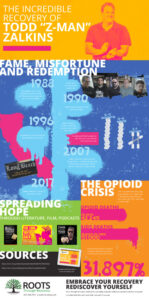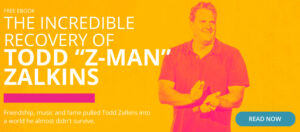This is part two of the series The Incredible Recovery of Todd “Z-Man” Zalkins. Read part one here.
Although the opioid crisis has been less severe in California than in other states—a fact that some experts attribute in part to California’s diverse demographics, according to the Los Angeles Times—southern California is the state’s most-affected region.1
Zalkins has seen firsthand the impact of the opioid epidemic on his community. “I got clean and sober in 2007, just before this ‘bubble’ of the crisis was getting ready to burst,” he says. “The last three to four years, young people are dying in parking lots outside of fast-food restaurants in the middle of the day. You hear over and over that it wasn’t long ago that he or she was a good student once upon a time or never even had a drug problem. I have run into this scenario dozens of times.”
FAIR Health, a non-profit organization dedicated to transparency in healthcare costs, analyzed data from its massive database of 23 billion privately billed health insurance claims to study the opioid crisis in the nation’s five most populous cities. According to the analysis, private insurance claims in southern California citing opioid-related diagnoses increased by 31,897 percent—yes, you read that right—from 2007 to 2016.2
“This is a problem that isn’t going away anytime soon,” Zalkins says. “In fact, in time, it will take more lives than the AIDS crisis in the 1980s, with really no end in sight.” At its peak in 1995, according to the Centers for Disease Control and Prevention, the AIDS crisis had claimed 311,381 lives, 51,000 during that year alone.3 By comparison, 42,249 opioid overdose deaths occurred in 2016 alone, a five-fold increase since 1999, according to the CDC. To date, the opioid crisis has claimed more than 200,000 lives.4
“I look at it no different than a wildfire that’s out of control,” Zalkins says. “We can help some people by pulling them out of the fire, but many are continuing to perish because of it.”
Disreputable Treatment Facilities Fuel the Fire
When we asked about current laws or policies that Zalkins feels are especially damaging in terms of the opioid crisis, he doesn’t hesitate. “The inability of our own government to regulate the quality of substance abuse treatment and sober living facilities that run unchecked in our society,” he answers.

Indeed, although southern California is home to many legitimate treatment centers, many others engage in deceptive and fraudulent practices involving body brokering, drug-testing mills and fraudulent insurance claims, according to a recent article in The Orange County Register.5
Because Obamacare rules require insurance companies to pay for addiction treatment, and health insurance policies can be purchased through Covered California immediately upon arrival in the state, disreputable rehab centers advertise nationally to bring in addicted individuals from all over the country, even offering “scholarships” that cover their travel expenses and insurance premiums and deductibles. Once these individuals are set up in a “rehab” program, the program operators bill the insurance company for a wide range of services while providing very little in the way of effective treatment.
In some cases, once individuals graduate from the “program,” they’re sent to live in an affiliated sober living home. There, drugs are made available to them, and after relapsing, they start the whole “rehab” process over again. In other cases, when their insurance money dries up, individuals are tossed out onto the streets, where they inevitably turn back to drugs. This practice, known as “curbing,” has contributed to a rise in homeless populations across the region.
The Rehab Riviera
A recent Southern California News Group investigation uncovered a number of issues that help explain the proliferation of treatment and sober living facilities in Southern California, which has been dubbed the “Rehab Riviera” by industry insiders. To date, the area is home to 1,117 licensed rehab centers and thousands of unlicensed and unregulated sober living homes.
The investigation’s findings include these sobering facts:
- Licensing requirements allow almost anyone to get a license to run a rehab center. Some programs are being run by ex-cons, and others are run by doctors on the verge of losing their medical licenses.
- Just sixteen Sacramento-based inspectors oversee nearly 2,000 rehab centers in California.
- Getting unbiased information about treatment facilities is difficult. The state maintains official assessments only on paper, and only in Sacramento.
- Every two weeks on average, someone dies in a licensed rehab center in the state, but privacy laws make information about deaths inside of rehabs difficult to find.
It’s not just that these disreputable programs exist, but also that separating the good from the bad can be a daunting and complicated task. Unfortunately, it is not yet common knowledge that it’s a completely necessary one.
The Problem of Limited Access to Quality Treatment
While insurance companies, state and federal regulators and local and national law enforcement agencies are investigating and suing some of the biggest players in the rehab scam, many others are falling through the cracks, according to The Orange County Register. And while legislators on both sides of the aisle are pushing for new state and federal regulations for treatment programs and sober living homes, the current state of affairs is dismal.
“One of the biggest problems we have,” Zalkins says, “is when people want help, but there’s no availability due to the lack of facilities that can provide decent care unless the person has either financial resources or above-average health insurance.”
What’s really needed for the opioid epidemic, Zalkins says, is more funding for reputable treatment centers, where addicted individuals can safely detox or access medication-assisted treatment, along with counseling services and other programs to help them stay in recovery.
Still, despite the “bad seeds trying to make a quick buck,” the treatment industry in southern California is an industry Zalkins is proud to be a part of. “Let’s not forget the masses of awesome people who value their credentials and take pride in this profession of saving lives,” he says.
Drug addiction has been a long problem in the country affecting millions of individuals. That is why we offer drug rehab in Long Beach as well as sober living options. Visit 3939 Atlantic Ave, Suite 102 Long Beach, CA 90807 or call (866) 766-8776 for immediate assistance.
Read part three of this series, The Incredible Recovery of Todd “Z-Man” Zalkins, Part III: After Addiction – A Life of Recovery and Service , or download the entire series now as a fully illustrated eBook:




